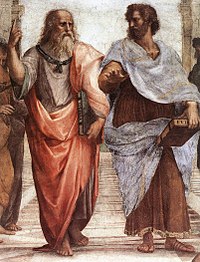
Photo from wikipedia
through the first chapter. Thereafter, we have a very readable history of ideas of a conventional kind, but little attempt to pause to ask whether the concept has changed, and… Click to show full abstract
through the first chapter. Thereafter, we have a very readable history of ideas of a conventional kind, but little attempt to pause to ask whether the concept has changed, and if so, how. A related anxiety is that it is not entirely obvious that a focus on the term “liberal” illuminates the history of “liberalism.” Here is where Duncan Bell’s views should have caused Rosenblatt more anxiety than they seem to have done. Liberalism seems intrinsically political in its scope; liberal primarily embraces aspects of individual character, as well as social, political, and economic arrangements. But someone may be liberal in the sense of generous without it following that they are “a” liberal. A roaring Tory who enjoys company may be a liberal host and a political reactionary. By the same token, a liberal teetotaler of whom there were many in nineteenth-century Britain, was likely to be less liberal as a host but impeccably liberal in politics. Rosenblatt knows all this; she does not suggest that Cicero was a liberal, but then it is less obvious why Cicero on liberality is the right place to begin. One wonders, too, whether a rather different conceptual history would have emerged if the concept chosen had been liberty rather than liberal. Rosenblatt is, after all, one of the world’s foremost scholars on Benjamin Constant; she starts here from Cicero on liberality, but what if she had begun with Athenian notions of liberty— which Constant thought were “modern” in a way that Spartan notions were not? One might, then, think that her belief that it is only the critics of liberalism who trace its origins to Hobbes needs some modification. It is, after all, Hobbes who produces what is, in essence, the negative conception of liberty. Still, these are minor quibbles. The insistence that liberalism is not committed to the view that human beings are narrowly concerned with their own interests to the exclusion of any concern for the common good is well taken. The idea that the essence of liberalism is state neutrality would have come as a surprise not only to Constant and Tocqueville but also Mill, Hobhouse, and John Dewey among a host of others. It is good to be reminded of this.
Journal Title: Perspectives on Politics
Year Published: 2019
Link to full text (if available)
Share on Social Media: Sign Up to like & get
recommendations!